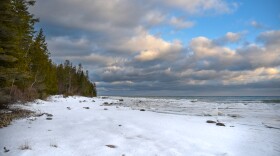-
Holtec Internation had been saying it planned to resume generating power by the end of 2025. That timeline has now shifted to the start of the new year.
-
Fish in Michigan's inland lakes are shrinking because of climate change, according to a new study from the University of Michigan.
-
Cooler temperatures this week are giving Michiganders a break from air conditioning and a chance to pull out their fall sweatshirts. For birds, it’s migration time — with more than 3.6 million birds moving across the state last night.
-
Smoke from Canadian wildfires is expected to impact Michigan's summer air quality going forward, according to climatologist.
-
Destructive tornadoes have hit states such as Missouri, Illinois, Kentucky and Indiana this season as activity shifts east. Meanwhile, scientists say dry and hot weather in the Great Plains brought on by climate change could be slowing the number of tornadoes there.
-
A Michigan State University researcher is testing which tree species can best withstand future climate conditions in Michigan. With a $500,000 grant from the state, the project is planting tens of thousands of trees across nine sites to study growth, survival and adaptability. The research could shape forest management for decades.
-
Michigan public health officials are urging people to exercise caution outdoors and avoid ticks, as lyme disease cases have nearly tripled in the last five years.
-
One of many institutes at risk is the Cooperative Institute for Great Lakes Research based at the University of Michigan. It's partly funded by NOAA to research invasive species, extreme weather, and toxic cyanobacterial blooms.
-
All six U.S. regional climate centers will remain online through a new contract deadline in mid-June. Four of the centers, which are overseen by the National Oceanic and Atmospheric Administration, were abruptly closed last week after their funding ran out.
-
Supporters of the EPA's work in Michigan and the U.S. to protect the environment urged Congress to rein in a plan to roll back multiple pollution regulations.
Play Live Radio
Next Up:
0:00
0:00
Available On Air Stations










